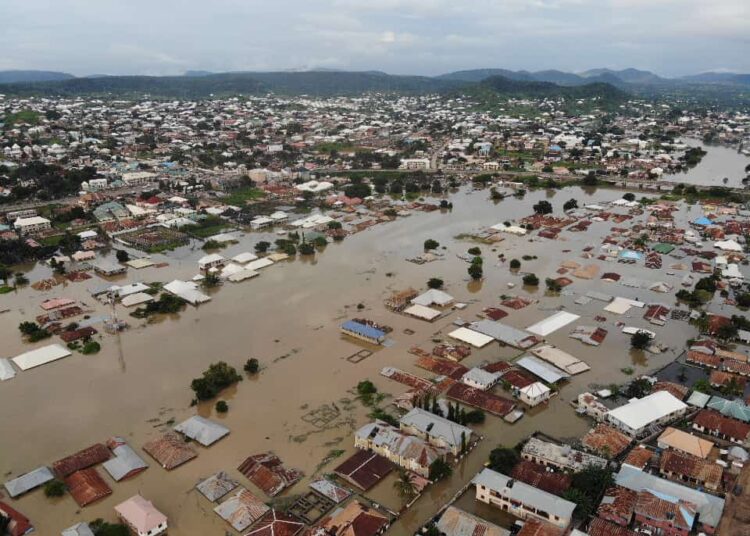Several states across the country are gearing up to implement comprehensive mitigation measures in anticipation of the imminent release of water from the Lagdo Dam.
The Lagdo Dam is a large dam situated on the Benue River in Cameroon constructed to serve various purposes, including hydroelectric power generation, irrigation, and flood control. The dam’s reservoir helps regulate the water levels of the Benue River, which is particularly important during the rainy season to prevent flooding downstream.
However, amid plans to open the reservoir, local residents are being informed about evacuation plans and safety guidelines, as the dam’s opening is expected to impact water levels and riverbanks. The coordinated efforts aim to minimise the impact of the dam’s release and safeguard the affected regions.
At the moment, the state authorities are collaborating closely to ensure that communities in low lying districts are well-prepared for potential flooding risks.
LEADERSHIP reports that authorities at the National Emergency Management Agency (NEMA) have been alerted over a possible flood along the River Benue basin in a few days.
Issuing the alert was the Ministry of Foreign Affairs in a letter dated August 21, signed by the director of African Affairs, Umar Salisu.
To avert the flood as part of commitment to aid those affected by rising water levels caused by the River Benue’s overflow, the Edo State Government has issued a call to action for residents living in lowland and riverine areas within the state.
The precautionary advisory comes ahead of the anticipated release of modulated water amounts into the River Niger from the Lagdo Dam by Cameroonian authorities, a measure taken due to flooding caused by continuous heavy rainfall.
RELATED: Minister Rules Out Threat Of Immediate Flood From Rivers Niger, Benue
Notable communities in the advisory include Agenebode in Etsako East Local Government Area (LGA), Anegbete in Etsako Central LGA, and Illushi in Esan South East LGA. Additionally, riverine regions within Ikpoba Okha LGA, Ovia North-East LGA, and Ovia South-West LGA are also affected.
According to a statement by the commissioner for Communication and Orientation, Chris Nehikhare, the Edo State Government is actively monitoring the situation and advises residents to remain vigilant and consider relocating to higher ground.
The advisory also extends to areas within Ikpoba Okha, Ovia North-East, and Ovia South-West, urging them to stay on alert.
In Rivers, the State government has commenced sensitisation in rural communities in the state ahead of the expected flood following the imminent release from the Cameroonian dam.
Already, the state governor, Siminalayi Fubara, had set up a committee headed by the commissioner for Special Duties, Chukwuemeka Woke, to handle the issue.
LEADERSHIP gathered that the committee had already commenced its sensitisation with a visit to Opobo/Nkoro local government area of the state.
Niger State
In Niger State, residents most likely to be impacted are those residing along the lower reaches of the three Hydro Power Dams: Shiroro, Kainji, and Jebba.
The vice chairman of North-South Power Company, Mr. Olubumi Peters, responsible for the Shiroro Dam, has taken proactive steps. During a recent stakeholders’ flood sensitisation and awareness forum, he assured the community of coordinated actions.
He stressed the need for innovative strategies to reduce flooding impact on those situated along the floodplain.
In Niger State, various precautionary measures have been enacted. These include the temporary relocation of individuals residing on the floodplain of the Rivers Niger and Kaduna to safer grounds. The state government highlighted the vulnerability of 11 local government areas that are most susceptible to flooding.
Acting director general of Niger State Emergency Management Agency (NSEMA), Garba Salihu, identified Mokwa, Lavun, Edati, Lapai, Gbako, Bosso, Chanchaga, Rijau, and Agaie as the LGAs to be predominantly affected.
He outlined plans to mobilise these communities to temporarily relocate to available Internally Displaced Persons (IDP) camps until the flood situation is under control.
Cross River
The Cross River State Government has stated that it is poised to address the imminent floodwater challenge anticipated from the opening of the Lagdo Dam in the northern region of the Republic of Cameroon.
The director general of Cross River State Emergency Management Agency (SEMA), Angela Ogeyi Odey, said:
“We are fully prepared in Cross River State to tackle potential flooding. Our manpower is being readied, and our personnel are undergoing training to efficiently carry out evacuation procedures.”
She listed the LGAs likely to be affected as Calabar Municipality, Ikom, Ogoja, Yakurr, Yala, Bakassi, Akpabuyo, Etung, Odukpani, Obubra, and Biase.
To effectively manage the situation, the state is arranging relief materials and deploying flying boats for evacuation purposes.
Odey mentioned efforts to disseminate information through town criers and engage with local youths to ensure collective participation in disaster response.
“We are committed to assisting our people. Following the evacuation, we have devised plans to provide them with temporary accommodations. We have hostels, schools, and other facilities ready to house them until October,” the director general affirmed.
Kogi
In Kogi, the commissioner for Environment , Victor Omofaiye, has assured that comprehensive measures are in place to mitigate the potential impact of water release into the Benue River. The focus, he said, is on minimising the risk of disaster, loss of lives, and property damage to the lowest possible extent.
Omofaiye emphasised the state government’s commitment to safeguarding communities by implementing embankments along the river Niger.
“In response to signals from NiMET and the National Emergency Management Agency, immediate action was taken,” he stated. “We conducted on-ground visits to flood-prone zones, educating residents about the inherent dangers of residing near river banks.”
Omofaiye further highlighted ongoing preparations by the state government to establish IDP camps to accommodate those affected.
“Rather than waiting for the flood to arrive, our approach is to plan ahead,” he said.
Delta
To reduce flooding in Delta State, the state government has continued the construction of the storm water projects being executed in the Warri and Uvwie areas of the state after completing the Asaba project.
To facilitate the project, Governor Sheriff Oborevwori appointed a director-general, Special Duties, Chief Frank Omare to remove structures obstructing the ongoing project.
Chief press secretary to the governor, Sir Festus Ahon, said the state had been removing obstructions in the waterways, canals, and drainages. He equally said the state had embarked on serious sensitisation to enlighten residents against dropping waste and obstructions that can block free flow of water in the gutters, drainages, and others.
Those living in the coastal areas are equally advised to vacate the areas and move to higher grounds for safety purposes. According to him, while nobody prays for such calamity again, he said the state will further work on the IDP camps, especially in the rural areas if the flood threatens again.
In fact, the demolition of buildings and other illegal structures erected on natural water channels in Warri, Uvwie, Udu, Sapele, Ughelli, and other parts of the state as part of its flood control measures had started.
At Ugboroke Layout, a one-storey building and a church on Nemejor and Auntie Rose streets were among the structures to be pulled down. On the NNPC Housing Complex road, some buildings under construction on a water channel around a new Estate were also identified for demolition.
At the Ekpan Roundabout, a storey building constructed not quite long, but sitting on a channel from which other drains in the area discharge water to the Ekpan River, was marked for demolition.
Omare equally ordered those who converted part of the water channel to wood market in the area to vacate the place or risk having their property destroyed.
Kebbi
The Kebbi State Government has proactively sought comprehensive solutions to prevent flood disasters throughout the state.
Speaking exclusively with LEADERSHIP in Birnin Kebbi, Abdullahi Umar Faruk Muslim, the commissioner of Works and Transport, revealed that Governor Nasir Idris had implemented substantial measures to put an end to the annual havoc caused by flooding.
Under the current administration, a significant contract worth over N9.2 billion had been allocated for the construction of new highways in the state capital, Birnin Kebbi.
The general manager of Kebbi Urban Development Authority (KUDA), Alhaji Abubakar Umar Ika further said the governor had allocated funds for the thorough cleaning and clearing of refuse from all the drainage systems within the state capital, Birnin Kebbi.
This comprehensive cleansing operation was carried out by his team between June and July this year.
The executive director of Kebbi State Emergency Management Agency (KSEMA), Alhaji Abbas Rabiu Kamba also confirmed that the state government had procured relief items.
Bauchi
In anticipation of the upcoming rainy season and the predicted flood occurrences, the Bauchi State Government has proactively undertaken the dredging of rivers in flood-prone riverine communities. This initiative aims to avert potential casualties arising from floods within the state.
The director general of Bauchi State Environmental Protection Agency (BASEPA), Dr. Kabir Ibrahim explained that as soon as NiMET forecast floods in eight local government areas of the state, BASEPA collaborated with stakeholders from the affected regions. Through this collaboration, 56 flood-prone communities were identified, out of which 40 are located in riverine areas.
A key recommendation from the stakeholders was the desilting of rivers in these communities to accommodate the anticipated volume of water during the rainy season.
Regarding the alert issued by Cameroonian authorities about the release of water from the Lagdo Dam into the Benue River, Dr. Kabir assured that Bauchi State faces minimal exposure to the consequences of this release.
He clarified that only River Dindima lies on the Upper-Benue trough, while the remaining areas are situated around the Hadeja-Jama’are River, which will remain unaffected.
Dr. Kabir elaborated that the agency has already delineated specific areas within communities to establish IDP camps.
Engineers proffer way out of flooding in Nigeria
The Nigerian Society of Engineers (NSE) has unveiled a set of practical approaches aimed at tackling the persistent flooding while also addressing the concerns surrounding fuel subsidy removal and electricity price hikes in Nigeria.
Speaking during a press conference in Abuja, the president of NSE, Engr Tasiu Sa’ad Gidari-Wudil highlighted the organisation’s core mission, emphasising its commitment to collaborating with governmental bodies and various stakeholders to offer expert guidance for national progress.
Wudil underlined that engineering plays an integral role in comprehensive development within any country.
He further expressed the necessity for the NSE to provide well-informed recommendations concerning strategies to alleviate the impact of flooding, as well as effectively manage the challenges posed by fuel subsidy removal and electricity rate increases in the nation.
Notably, Wudil stressed that while it may not be feasible to prevent flooding entirely, it is possible to mitigate its destructive effects through effective management strategies.
He called on the government to immediately commission engineering consulting firms for study of the river basins in Nigeria to acquire relevant data for detailed engineering designs.
“The federal and state governments should immediately commission task teams of relevant professionals to carry out a detailed study of all infrastructure impacted by the 2022 floods with a view to making recommendations for repairs and reinstatement and determining the cost of infrastructural damages caused by the 2022 flood.
“Palliative repairs of damaged infrastructure to promote unhindered socio-economic activities should be done. Relevant government agencies should as a matter of urgency consider exploring the deployment of sustainable early warning systems and dam instrumentation where they do not exist and ensure adequate maintenance and upgrade where they already exist to protect lives, farmlands, properties, and settlements.
“The federal and state governments should issue immediate directives to relevant MDAs to identify flood-prone areas within the country. Approving authorities should desist from issuing approvals for development in and along flood plains forthwith. International setback rules should be strictly enforced.”
The group urged federal and state orientation agencies and the media to conduct massive public education and enlightenment in English and local languages on the dangers of unacceptable environmental practices such as infrastructure vandalism, uncontrolled development in and along flood plains, dumping of refuse on roads, drainage channels, culverts, under bridges and water bodies by individuals and unlicensed refuse collectors, amongst others.
Speaking further on the fuel subsidy removal and electricity hike, the society said that NERC should ensure that licensees are only allowed prudent and justifiable cost escalation, as the pass-through costs only.
“Licensees should be made to look inwards and reduce their expenses on operational line items such as: payment for technical partners, payment for consultants, payment for vending services/billing and collections, an over-bloated payroll, payment for concession services that the staff can provide and heavy management and Board expenses,” he said.
He said that the Weighted Average Cost of Capital (WACC) should be prudently calculated for the industry and, even at that, no licensee should be allowed a new CAPEX review now as they have not demonstrated any firm capacity and commitment in the execution of the earlier approved CAPEX.
He said, “All unutilised allowed CAPEX can be clawed back for them to execute as a provisional sum only, and to be claimed in the tariff only when executed. DisCos must adequately compensate their customers for any investment made in their network without any excuses.
“Licensees must be made to evacuate power, grow their customer number, and metering as a sine quo non for their survival as a business. DisCos should bear the consequences of not adhering to the service level provisions in the Service Based Tariff regime on feeders supply availability, by adequately refunding the customers for non-adherence.
They also call on the Automotive/Locomotive Engineers Institute of Nigeria (AutoEI), the Nigerian Institution of Mechanical Engineers (NIMechE), the Nigerian Society of Chemical Engineers (NSChemE) and the Nigerian Institution of Petroleum Engineers (NIPetE) (all divisions of the Nigerian Society of Engineers)to tackle this challenge by developing practical solutions for effective conversion from PMS to CNG.





